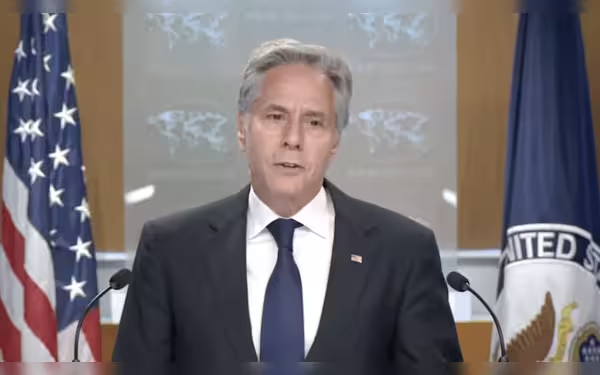Saturday, November 16, 2024 05:37 PM
RT News Agency's Cyber Capabilities Linked to Russian Military Operations
- RT news agency linked to Russian intelligence services.
- Cyber unit involved in military procurement for Ukraine.
- U.S. sanctions target Russian media influence globally.
 Image Credits: thefrontierpost
Image Credits: thefrontierpostU.S. State Department reveals RT's cyber capabilities aiding Russian military efforts in Ukraine.
In recent developments, the U.S. Department of State has raised serious concerns regarding the activities of Russia’s RT news agency. This media outlet, which has been accused of conducting covert influence operations in the United States, is reportedly extending its reach globally. According to Secretary of State Antony Blinken, RT has embedded a unit with 'cyber operational capabilities' that is linked to Russian intelligence services. This unit was established in the spring of 2023 and operates under the full knowledge of RT's leadership.
RT is not just a news agency; it is allegedly involved in military procurement to support Russia's ongoing war in Ukraine. Blinken highlighted that information generated by this cyber unit is funneled to various Russian entities, including intelligence services, media outlets, and mercenary groups. This indicates a sophisticated network aimed at gathering intelligence and potentially leaking damaging information.
James P. Rubin, a special envoy for the Global Engagement Center, elaborated on the unit's operations, describing it as a 'cyber-intelligence gatherer.' This means that the unit uses advanced cyber tools to collect information, which can then be utilized in various ways, including the dissemination of harmful narratives. One notable project involves a large online crowdfunding initiative that operates through RT and social media, aimed at providing military supplies to Russian forces in Ukraine.
Despite the crowdfunding program being publicly visible, RT's involvement remains concealed. Recently, two RT employees were indicted for their roles in a $10 million operation that aimed to spread pro-Russian narratives to American audiences. This raises questions about the extent of RT's influence and the potential risks it poses to democratic processes worldwide.
Assistant Secretary of State James O’Brien emphasized that the latest revelations are not just about the U.S. but also about the global implications of RT's activities. The State Department pointed out examples of RT's influence in other regions, such as a platform called African Stream, which claims to represent independent African voices but is actually promoting Kremlin propaganda.
Furthermore, Blinken noted that RT's overarching goal is to manipulate democratic elections globally. He specifically mentioned Moldova, where the U.S., U.K., and Canada have accused Russia of attempting to interfere in the upcoming presidential election. In response, the U.S. Treasury Department has imposed sanctions on Russian media operations, aiming to curb their influence.
As the situation unfolds, it is clear that the U.S. and its allies are taking a stand against the threats posed by RT and similar entities. The joint diplomatic campaign launched by the U.S., U.K., and Canada aims to rally support from other nations to combat the spread of Russian disinformation. This situation serves as a reminder of the importance of media literacy and vigilance in the face of misinformation, especially in an era where information can be weaponized to disrupt societies and influence political outcomes.













